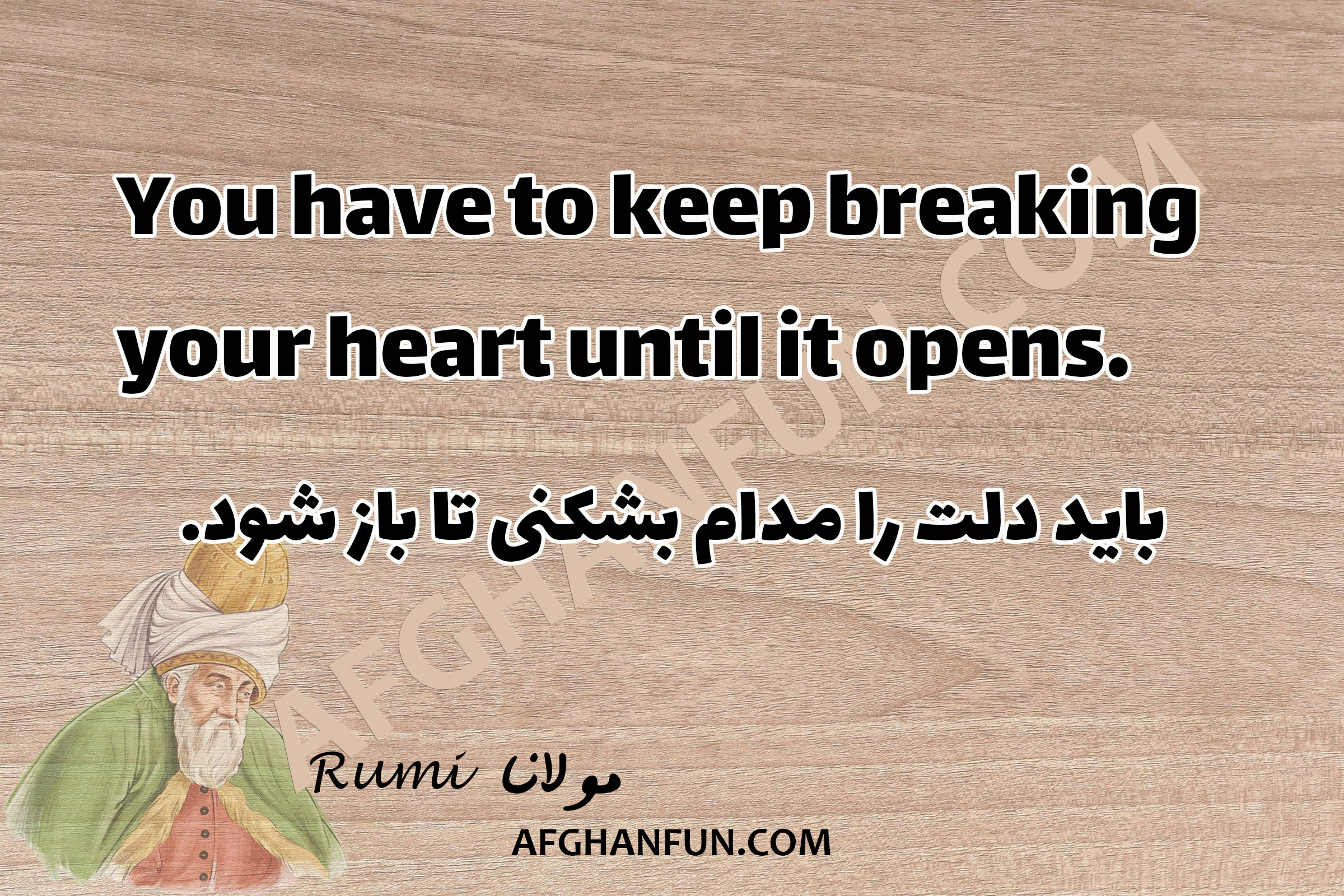Rumi’s Most Powerful Lesson: Why Heartbreak Is Necessary for Love
You have to keep breaking your heart until it opens.
Rumi
Rumi’s Quote That Will Change How You See Heartbreak Forever
باید دلت را مدام بشکنی تا باز شود.
مولانا
شکستن قلب: منظور از شکستن قلب، شکستن خودخواهیها، تعلقات دنیوی و بندهای نفسانی است. این عمل، دردناک و دشوار است، اما برای رسیدن به معرفت و حقیقت ضروری است.
باز شدن قلب: با شکستن این بندها، قلب برای دریافت عشق الهی و نور حقیقت آماده میشود و انسان به مرحلهای از آگاهی و معرفت میرسد که پیش از آن تجربه نکرده است.
تکرار: کلمه “مدام” نشان میدهد که این عمل شکستن و باز شدن، یک بار اتفاق نمیافتد، بلکه باید به صورت مداوم و پیوسته ادامه یابد. انسان در طول مسیر عرفان، بارها و بارها با خودخواهیها و تعلقات جدید روبهرو میشود که باید آنها را بشکند.
به عبارت دیگر، این جمله به ما میگوید که برای رسیدن به کمال و معرفت، باید از خودگذشتگی کنیم، نفس خود را بشکنیم و قلبمان را برای دریافت عشق الهی آماده کنیم.
Rumi on Love and Growth: Why Breaking Your Heart Leads to Healing
Лозим аст дилатро пайваста бишиканӣ, то ки кушода шавад.
МАВЛОНО ҶАЛОЛУДДИН МУҲАММАДИ БАЛХӢ
Шикастани қалб: Маънои шикастани қалб, шикастани худхоҳӣҳо, пайвандҳои дунёвӣ ва бандҳои нафсонӣ аст. Ин амал, дарднок ва душвор аст, вале барои расидан ба маърифат ва ҳақиқат зарур аст.
Боз шудани қалб: Бо шикастани ин бандҳо, қалб барои қабули ишқи илоҳӣ ва нури ҳақиқат омода мешавад ва инсон ба марҳилае аз огоҳӣ ва маърифат мерасад, ки пеш аз он таҷриба накардааст.
Такрор: Калимаи “мудом” нишон медиҳад, ки ин амали шикастан ва боз шудан, як бор рух намедиҳад, балки бояд ба таври мудом ва пайваста идома ёбад. Инсон дар давоми роҳи ирфон, бориҳо ва бориҳо бо худхоҳӣҳо ва пайвандҳои нав рӯ ба рӯ мешавад, ки бояд онҳоро шиканад.
Ба истилоҳи дигар, ин ҷумла ба мо мегӯяд, ки барои расидан ба камол ва маърифат, бояд аз худгузаштагӣ кунем, нафси худро шиканем ва қалбамонро барои қабули ишқи илоҳӣ омода кунем.
Finding Strength in Pain: Rumi’s Powerful Quote on Love and Resilience
عليك أن تستمر في كسر قلبك حتى ينفتح.
مولانا جلال الدین محمد الرومي
كسْرُ القَلْب: المقصود بكسْرِ القَلْبِ هو كسْرُ الأنانية والارتباطات الدنيوية وأسر الأنا. هذا العمل مؤلم وصعب، ولكنه ضروري للوصول إلى المعرفة والحقيقة.
انفتاح القلب: بكسْرِ هذه الأسر، يصبح القلب مستعدًا لاستقبال الحب الإلهي ونور الحقيقة، ويصل الإنسان إلى مرحلة من الوعي والمعرفة لم يسبق له تجربتها من قبل.
التكرار: كلمة “مدام” تشير إلى أن هذا العمل، عمل كسر وانفتاح، لا يحدث مرة واحدة، بل يجب أن يستمر بشكل مستمر ومتواصل. يواجه الإنسان في طريقه الصوفي الأنانية والارتباطات الجديدة مرارًا وتكرارًا، ويجب عليه كسرها.
بعبارة أخرى، هذه الجملة تخبرنا أنه للوصول إلى الكمال والمعرفة، يجب التضحية بالنفس وكسر الأنا وإعداد القلب لاستقبال الحب الإلهي.
This quote by Rumi — “You have to keep breaking your heart until it opens” — is a profound and paradoxical statement about the nature of love, vulnerability, and spiritual awakening. Let’s unpack the layers of meaning in this short but rich line.
“You have to keep breaking your heart…”
At first glance, the idea of breaking the heart sounds painful, even counterproductive. The heart is often associated with love, the emotional core of our being, and in many cultures, it represents our center of feeling, compassion, and connection to others. To “break” the heart implies enduring sorrow, disappointment, or loss, which can be deeply unsettling.
However, Rumi’s teaching here is not about literal suffering for its own sake; rather, he is referring to the emotional and spiritual vulnerability that comes with truly opening oneself to the world, to others, and to divine love. The “breaking” of the heart is not an end in itself, but a process of stripping away the ego, expectations, and attachments that create barriers to love and spiritual awakening.
In Sufi mysticism, love is seen as a transformative force — it dissolves the boundaries of the self and connects us to something greater. To experience this love fully, we must be willing to endure moments of emotional upheaval, loss, or discomfort, because these are the occasions when we are most likely to let go of our false sense of control and allow ourselves to be more deeply open.
The repeated action of “breaking” the heart suggests that emotional and spiritual growth is a continuous process. It’s not a one-time event, but an ongoing journey. Each time the heart is broken, it has the potential to open wider, to expand in its capacity to love and to understand. It’s a process of dismantling the walls we build around ourselves — walls that protect us from feeling, from connection, from love.
“Until it opens.”
The second half of the line reveals the ultimate purpose of the breaking: to open the heart. But the key idea here is that this “opening” is not forced or contrived. It is a natural outcome of the heart’s vulnerability and surrender to life’s challenges and beauty. The opening of the heart is a metaphor for spiritual enlightenment, emotional liberation, and the deepening of one’s capacity for compassion.
To open the heart is to make room for more love — not just love for others, but an inner sense of peace and acceptance, a deep connection to the divine or the universe. Rumi often speaks of the heart as the seat of the divine. In many of his poems, he describes the heart as a vessel that, when cleared of ego, can hold the essence of divine love. The “breaking” of the heart is, therefore, a necessary purification process: each break, each crack, is a step toward making space for something greater — a deeper connection with both the human and the divine.
In this context, the heart opening is a form of spiritual awakening. The “breaks” are not signs of weakness or failure; they are the very catalysts of spiritual growth. They lead us to the realization that the love and understanding we seek are already within us, but we must be willing to let go of our protective layers and allow ourselves to experience life in its full range, including pain and joy, loss and gain.
Interpretation of the Paradox
Rumi’s message here is paradoxical. The idea of “breaking” as a means to “open” goes against conventional wisdom, which often tells us to protect ourselves from pain and suffering. We are conditioned to view pain and heartbreak as negative, something to be avoided at all costs. But Rumi suggests that heartbreak is a path to greater love and understanding. The heart must be broken open in order to experience the fullness of life and spiritual truth.
This process of breaking and opening can also be seen as a metaphor for the dissolution of the ego. The ego, with its attachments, desires, and protective walls, prevents us from experiencing the depth of connection that Rumi points to. To “break” the ego — to surrender it — is to open ourselves to something far greater than our individual self, and this is where true love and understanding lie. It is through vulnerability, through the willingness to be broken and humbled, that we discover the vastness of what we are and the depths of divine love that flow through us.
Rumi’s Call to Embrace Pain and Vulnerability
Rumi’s quote is a call to embrace vulnerability, not to shy away from it. The opening of the heart does not come from avoiding the pain of life, but from leaning into it, allowing it to soften and transform us. To be truly open is to allow ourselves to feel deeply, to love without reservation, and to be willing to face the inevitable losses and heartaches that come with being human.
In this light, the idea of “breaking” becomes less about suffering and more about growth. Each heartbreak — whether caused by a lost love, a personal failure, or a spiritual struggle — can be an opportunity to open further. When we stop resisting the pain, stop seeing it as something to be avoided at all costs, we begin to see that it has a purpose: to help us shed our limitations, soften our hearts, and make space for greater wisdom, compassion, and connection.
Conclusion:
Rumi’s phrase “You have to keep breaking your heart until it opens” is an invitation to a deeper way of living. It suggests that the path to spiritual enlightenment and love is not through avoiding pain, but through embracing it as a necessary part of the journey. The heart must break, over and over, to remove the layers of protection and fear that keep it closed. In doing so, it becomes more expansive, more connected, and more open to the divine and to the world around us. This breaking and opening process is an ongoing practice of surrender, vulnerability, and transformation, ultimately leading to a more authentic, loving, and spiritually awakened existence.
External links:
This Rumi quote, found on “Goodreads“











